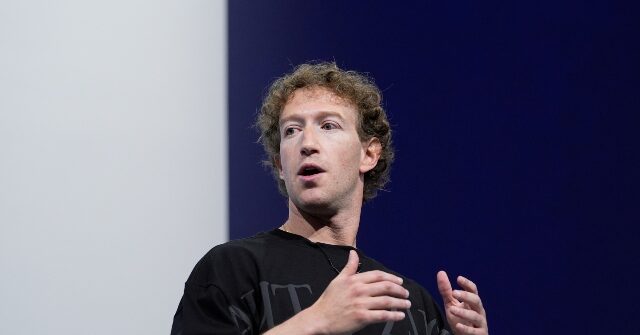The socialist government of Brazil, notorious for its online censorship campaigns, gave Facebook parent company Meta a 72-hour deadline this weekend to provide “explanations” on its decision to scrap its third party “fact check” system, known for its left-leaning bias.
The deadline, set to expire on Monday, was issued by Brazil’s Attorney General Jorge Messias, who demanded that the company explain how the changes could affect the South American country. Messias warned that his office could take unspecified “legal and judicial” measures against Meta if the company does not respond in time.
Last week, Meta’s CEO and founder Mark Zuckerberg announced that the company would make significant changes to its content moderation policies across its social media platforms, including lifting restrictions on topics such as immigration and gender identity and ending its notoriously leftist “fact check” system. Zuckerberg said it would replace that system with a crowdsourced “Community Notes” system on Facebook, Instagram, and Threads.
Brazil’s radical leftist President Luiz Inácio Lula da Silva described Zuckerberg’s announcement as “serious” in remarks given to reporters on Thursday and called for the company to “respect the national sovereignty of each country.”
“I think it’s extremely serious that people don’t want digital media to have the same responsibility as someone who commits a crime in the written press,” Lula said at the time.
The Brazilian president held a meeting with Attorney General Messias and other members of his cabinet on Friday to assess Facebook’s decision to end the fact-checking program. Lula announced two results of that meeting on social media.
“The first is a notification sent by the [Attorney General’s Office] for Meta to explain, within 72 hours, the changes to the policy on fact-checking and fake news, which could affect children, teenagers and women, for example,” Lula said.
“The second is the creation of a federal government working group, in consultation with the Legislative Branch, the Judiciary and civil society, to monitor the unfolding of the measures, strengthening freedom of expression without tolerating the violation of fundamental rights,” he continued.
Lula stressed that “all companies operating in the country must respect Brazilian legislation and jurisdiction.”
Brazil’s Chief of Staff Rui Costa claimed that the Brazilian government is “very concerned” about the announcement, which, according to him, will have a “huge impact on Brazilian society.”
“This has a huge impact on Brazilian society. It has an impact on children, when it comes to inappropriate content and child trafficking,” Costa said. “It has an impact on public security, when it comes to information that concerns people’s safety, criminal practice.”
Brazilian government institutions under Lula have been at the forefront of enacting censorship policies and forcing social media platforms to comply with numerous court orders that demand the complete and immediate removal of specific individuals or groups – or an end to the open discussion of certain subjects.
Brazil’s laws state that any social media platform wishing to operate in the country must have a legal presence and representative in the nation. Most of the censorship actions have been spearheaded by Supreme Court Justice Alexandre de Moraes, a self-styled anti-“fake news” crusader.
De Moraes has led two open inquiries against alleged “fake news” circulators and against so-called “anti-democratic digital militias” in recent memory, claiming the latter spread “fake news” and “threaten democracy” in Brazil. These inquiries have led to a pervasive censorship and persecution campaign against conservative Brazilian citizens, journalists, and politicians, most notably those supportive of former conservative President Jair Bolsonaro.
Last year, de Moraes imposed a nationwide ban on the social media platform X (formerly Twitter) after the platform initially refused to comply with a new round of censorship orders against its users and appointed a new legal representative in the country. The incident sparked a short-lived feud between de Moraes and X’s owner Elon Musk, who accused the judge of rigging the 2022 presidential election, which Lula narrowly won.
Despite the initial defiance and the nationwide ban, X ultimately caved, complied with the censorship orders, and paid millions of U.S. dollars in fines to the Brazilian government in October before its service was reinstated in Brazil.
During his announcement of Meta’s new content moderation policies, Zuckerberg said that “Latin American countries have secret courts that can order companies to quietly take things down,” but did not name a specific country.
In 2023, Brazilian leftist lawmakers introduced a bill to Congress for the fight against “fake news” that called for the regulation of content published on social media platforms and punishment for content the Brazilian government deemed “hateful.”
Although the bill’s debates have remained frozen since 2023 despite failed efforts to resume talks in 2024, Brazilian Vice President Geraldo Alckmin issued renewed calls for its approval in a radio interview on Thursday in response to Zuckerberg’s announcement.
“Just because someone is a millionaire doesn’t mean they can do what they want,” Alckmin proclaimed.
“You can’t have platforms, media outlets, even more so with a global presence, without responsibility. You can’t misinform. People can’t slander, lie, defame,” Alckmin said. “The regulation of the issue of fake news by the National Congress and the stance of the Judiciary are necessary in defense of society. It’s not because someone is a millionaire that they can do what they want.”
Christian K. Caruzo is a Venezuelan writer and documents life under socialism. You can follow him on Twitter here.
Read the full article here
